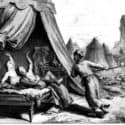
Parashat Pinchas: Violence in the Name of God
This Shabbat we encounter Parashat Pinchas (Numbers 25:10-30:1). The dramatic events surrounding the character of Pinchas actually begin at the end of last week’s portion (25:1-9):
And Israel abode in Shittim, and the people began to commit harlotry with the daughters of Moab. And they called the people unto the sacrifices of their gods; and the people did eat, and bowed down to their gods. And Israel joined himself unto the Baal of Peor; and the anger of the Eternal was kindled against Israel. And the Eternal said unto Moses: ‘Take all the chiefs of the people, and hang them up unto the Eternal in face of the sun, that the fierce anger of the Eternal may turn away from Israel.’ And Moses said unto the judges of Israel: ‘Slay ye every one his men that have joined themselves unto the Baal of Peor.’ And, behold, one of the children of Israel came and brought unto his brethren a Midianite woman in the sight of Moses, and in the sight of all the congregation of the children of Israel, while they were weeping at the door of the tent of meeting. And when Pinchas, the son of Eleazar, the son of Aaron the priest, saw it, he rose up from the midst of the congregation, and took a spear in his hand. And he went after the man of Israel into the chamber, and thrust both of them through, the man of Israel, and the woman through her belly. So the plague was stayed from the children of Israel. And those that died by the plague were twenty and four thousand.
Thus, Pinchas witnesses an Israelite man and a Midianite woman engaged in a cultic sex act in the Tent of Meeting, and he killed them immediately. Why? What were his intentions? What caused this grandson of Aaron to commit a sudden act of violence?
Is he a vigilante? Does he “take justice into his own hands?” Or is he acting within his role as a Priest?
In our portion this week, Pinchas is rewarded for his actions. God grants his lineage with Brit Shalom – a covenant of peace, which will ensure them the priesthood in future generations. Was the killing a way of ensuring the success of his descendants? Or might it have been a tragedy committed for the good of the greater community?
Additionally, if the slain couple are merely presented as examples of what not to do, why does the Torah provide their names? What should it matter that they are named Zimri and Cozbi? I suggest this fascinating piece about the political side of the Zimri-Cozbi relationship, to enhance your studies.
Together, we will discuss the nature of this incident, and what the implications might be for us today. As we wrestle with the degree to which we each infuse our daily lives with our personal religious ethics, we must confront the violence of Pinchas’ actions. Is killing, in the name of God, ever justified?
Shabbat Shalom!





